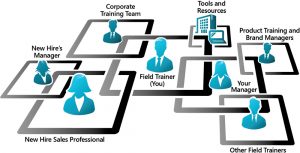Feature Story – By Marcy Lantzy
Your role as a field trainer requires the ability to effectively lead and influence others.
A matrix organization is one in which leaders are responsible for activities that impact multiple groups throughout the company. Consider your role as a field trainer.
A field trainer:
 Is often responsible for assisting in or completing the onboarding of new sales professionals, conducting regional or district trainings, working with their direct manager or the new-hiring manager and collaborating with other field trainers to ensure alignment across the organization.
Is often responsible for assisting in or completing the onboarding of new sales professionals, conducting regional or district trainings, working with their direct manager or the new-hiring manager and collaborating with other field trainers to ensure alignment across the organization.- Must be able to coordinate training activities with the corporate training team and build relationships with product training and brand teams.
- Works closely with operations and logistics support for key initiatives.
- Requires the ability to access and maximize available resources to prepare for training initiatives.
Think about what skills you already demonstrate as a field trainer and what you might want to develop.
On top of this, you may also have your own customers and territory to work to achieve your sales goals beyond the field trainer requirements.
Your role as a field trainer requires the ability to effectively lead and influence others within this kind of matrix organization — think of yourself as an emerging leader. Below are a few effective techniques to help improve your leadership impact.
Field Trainer Characteristics
Be the Go-To Person. Becoming the “go-to” person is a common characteristic of a leader in any organization. Think of someone you work with regularly who is a “goto” person. What skills did they have that made you feel they were the “go-to” person?
Some of these skill likely include being knowledgeable, flexible or consistent, always learning, remaining calm under pressure, always delivering and an eagerness to help others. Think about what skills you already demonstrate that make you a “go-to” person as a field trainer and what you might want to develop to become that person in a matrix environment.
Cultivate Trust. Cultivating trust is important in everything you do. Whether at home, on a sports team, working with your peers, leading others or working to influence or gain support from leadership, trust is a key characteristic you will need as a field trainer.
Think of the leaders in your organization. What are some things they exemplify that have helped them gain the trust of others? Of those skills, which can you develop to gain trust as a field trainer? Here are a few ideas to consider:
- Be a good listener and be observant of non-verbal cues.
- Be open to the thoughts and opinions of others.
- Lead by example.
- Be transparent in feedback and communications.
Lead with Enthusiasm. Think about some of the leaders you trust. What is the demeanor most of them exemplify? Are they generally cranky and do they appear burdened by their leadership role? Chances are, they are enthusiastic about their job and the future of the company. They are genuinely interested and want to talk to others within the organization.
It is critical that leaders display enthusiasm in the workplace, because it is contagious. Every job, project and activity has unique fundamentals that, when respected, enhance the work. Engineers who truly revere math and physics, for example, tend to not only build better things but also to motivate other people (whom they often don’t manage) with their love of the discipline. The energy you display will help you succeed in leading and training people you don’t formally manage.
Thinking back to previous interactions, identify a time in which a teammate’s or trainer’s enthusiasm was contagious. How did their enthusiasm impact the task or encounter?
To illustrate the importance of demonstrating enthusiasm when leading others, remember these three principles:
- Enthusiasm demonstrates your own passion and concern for the person or situation. When you are enthusiastic in your communication, you demonstrate how important the topic is and how concerned you are for the person to succeed.
- Enthusiasm increases attention and retention. There are a number of studies that have been conducted to show the strong correlation between the effects of enthusiasm and learning and behavior outcomes.
- Enthusiasm is contagious. Think back to great teachers or coaches you had who really inspired you. Chances are, they had a lot of passion for what they were teaching. That enthusiasm probably played a big role in your own enthusiasm and interest.
Collaborating across multiple businesses within your matrix environment requires the ability to identify key points of contact and resources to achieve intended outcomes. As you continue through your field training role, be sure to reflect on the emerging leader characteristics as a foundation for your thinking and leadership planning and as a channel to increase your effectiveness and success.
Marcy Lantzy is vice president, innovation and marketing, for Proficient Learning.
Email Marcy at marcy.lantzy@proficientlearning.com.









